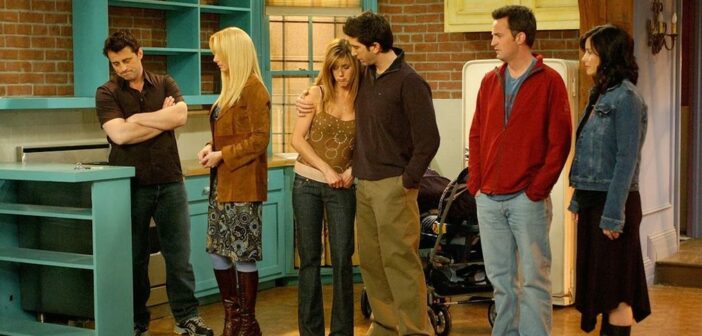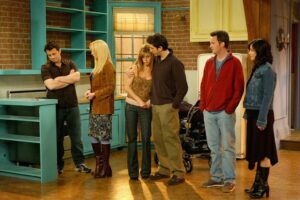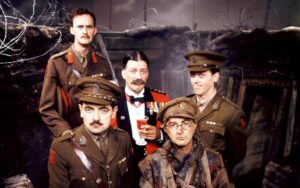Endings are often sad as events come to a close. TV finales are frequently huge media events in their own right with people coming together to watch the last few moments of our favourite characters on screen. Here are the TV finales we at the Edge believe are the saddest; be prepared for tears!
Fleabag
Fleabag is Phoebe Waller-Bridge’s gift to the sad, lonely, and horny population! The 2016 comedy show centres around the titular character, Fleabag, as she navigates the difficulty of grief, love, and family relations. Throughout the show, we realise all Fleabag wants is to be loved, and her fourth wall-breaking honest and witty comedy makes this the ultimate comfort show!
The second series takes a turn when the Hot Priest arrives, played by Andrew Scott, who Fleabag very quickly falls in love with. He is smart, funny, and connects with Fleabag more than any other character. The devastating ending scene takes place at a bus stop after the Priest chooses to remain a man of God. Fleabag confesses to the Priest “I love you”, he replies “It’ll pass.”, and in doing so, simultaneously punches every viewer in the stomach. There is nothing more painful than a love story without a happy ending. The viewer plays an important role in Fleabag, acting as the character’s confidant when she gives us hilarious looks and quips, but as she walks away with one last smile to the camera, we do not follow her. This Feeling by Alabama Shakes’ plays, and we hear the lyrics “And it feels so nice to know I’m gonna be alright.” Although sad, the ending signifies the character walking away from the judgement and constant viewer she feels in her life (think of the Margaret Atwood quote ‘You are your own voyeur’), but we know she’ll be alright, although we certainly aren’t alright without Fleabag in our lives, but I guess ‘It’ll pass’.
By Amy Scott-Munden
Friends
If there is one show, whose script runs rent-free in our brains, it is Friends. Full of iconic quotes delivered by a humorous and down-to-earth cast, the show ruled the nineties and noughties, which provided feel-good entertainment for an entire decade. Like all good things, however, the show eventually came to an end in 2004, doing so in an all-encompassing emotional fashion.
Out of all the shows I have ever shared a deep affection for – and believe me, there is a lot to be spoken of in that regard – no other ending has had such an impact as the finale of Friends. Being three years old at the time its conclusion was first aired, it is impossible for me to have lived through the show as millions did during its prime. Yet, the final sequence in which Rachel, Ross, Joey, Chandler, Monica and Phoebe set down their keys, and the camera pans out to show the empty apartment one final time, always sticks with me.
Whilst most shows begin to lose their charm and appeal after a few seasons, Friends increasingly bloomed into a global phenomenon, with the demand still healthy after an impressive ten seasons – with new and old fans alike still living with its legacy on the brain.
That simply goes to show how much emotional weight the show holds on anyone watching it for the first, third, or fortieth time, irrespective of the generation you are watching it in – an ending to forever top all endings.
By Ellie Griffiths
Blackadder
Frequently brought up when discussing the greatest British comedies of all time, Blackadder always had an edge to it as the ensemble cast would use historical settings to their comedic advantage. British humour is known for its sarcastic, satirical and self-deprecating nature and disastrous endings have never been too uncommon but, in most cases, the protagonist’s misery was the punchline. Blackadder has some perfect examples of this. From Lord Flashheart running off with Blackadder’s fiancé, Bob – aka Kate – to Baldrick, as an MP, spending £400,000 on a giant turnip. Point is, Blackadder, played by Rowan Atkinson, was no stranger to a sticky end.
‘Goodbyeee’, the final episode of Blackadder Goes Forth, however, is by no means an example of the British habit of making light of failure. The only word to describe this finale is poignant. Many TV finales can be sad but only a few are truly moving.
Despite the off-the-wall humour and antics of the cast, Blackadder Goes Forth was really quite grounded in reality. With perfect examples of British wit, this enhanced the satire of what was a rather recent setting. Unlike Tudor England or Georgian Britain, the people of the 1980s had faced the horrors of both world wars or knew someone who had first-hand. While the series does not dwell on it too much, it is entrenched within the setting.
The core cast remains in the trenches for the entire series with scenes in Melchett’s office and other locations here and there. During this time, throughout all the schemes, they are waiting to receive orders. Once received in the final episode, the humour does not immediately grind to a halt and there are a few more failed attempts to get them out of it. However, as the episode progresses and the jokes continue, there is a shift. George is the epitome of this. Played by Hugh Laurie, the bubbly, keen and rather air-headed character lightly brings up the fact that of the friends he signed up with, he’s the last one left. No joke there despite George’s jovial delivery.
Not included in the director’s original cunning plan, the episode’s closing image is that of the core cast going over the top with their war-torn trench fading into a poppy field, in reference to what has become the symbol of remembrance following the Great War. In this case, using the historical setting to their advantage in embracing the tragic events that had occurred just over 70 years before the broadcast.







